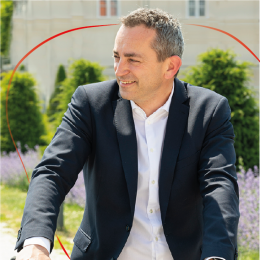Jul 16, 2021
A year with unexpected twists and turns lies behind us. In some ways, this Corona crisis has hit "reset" in many areas. Managing Director Martin Russ sums up the challenges and opportunities that have arisen as a result.

The pandemic has turned mobility behaviour on its head. Old and new ways of doing things have collided. New heights have been reached in walking and cycling, while at the same time the use of public transportation has decreased considerably. Communication could not allay people’s fears. This has led to a return to old patterns: when the virus is a danger lurking outdoors, a private vehicle has once again become an apparently safe space. This clearly demonstrates the urgent need for new services on the one hand and, on the other, for us to come together and have an earnest discussion. We have to fundamentally integrate mobility into our living environment and take concrete action accordingly.
We need evidence instead of gut decisions. The coronavirus has shown this to be true in every field. It is crucially important to have data, but also to interpret it and find relationships. This is also the case when it comes to actively managing the much larger crisis: we can only fight climate change with targeted, common action in every area of our lives in the economy. Mobility is the area that can do the most to help people move towards a climate-neutral life, especially because it is so clearly visible and accessible for everyone.
The issue of space distribution is now discussed more intensively than we would have thought in the recent past. Changes in mobility behaviour lead to a changing use of public space and increased quality of life. The street has become a living space. This is especially evident and striking in cities, which have become the centre of change. By altering the way we distribute space, we can create more room for sustainable mobility infrastructure, for example.
Yes, we saw a boost in e-mobility in 2020, which will continue into the future. We should take care, however, not to see electrification as a panacea. An electric car is, at the end of the day, still a car. It spends an average of 23 hours per day in a parking spot and only transports one person. E-mobility makes an important contribution, but is not the sole driver of clean mobility. A full package is necessary; people need variety and options. And they want to get moving in a more environmentally aware manner. Options like the 1-2-3 ticket are timely in this regard.
You have to communicate, discuss options, bring people with you on this journey. The coronavirus has shown our adaptability to new situations, and that we can stick together and do good together. My prognosis for the field of mobility is that we are a resilient society, change is tolerable for us. We can work well with changes. We should take advantage of this in our policy and in measures we enact.
Change naturally offers opportunities for businesses. But the business models need to be sustainable. A turning point is a true process of change at every level, beginning with one’s mindset. We are going to need ideas, technology and a variety of services. We don’t want to get in the way of value creation, but rather to reimagine it – for example, with new services that add value. That will require us to test, test, test. Try things out, learn, keep working at it. Promote an understanding of digitalisation and start by learning about the system as a whole.
Digital transformation provides agile, effective support for changes in mobility. Yet to take advantage of it, we need to connect sectors of society more closely together and think about what our workplace looks like in the future. What about our leisure time? Tourism? Shopping? Mobility has to be part of the experience. The measures we enact can then be much more coordinated, and we will have a better handle on their effectiveness. They can also be communicated in an understandable, transparent manner.
To extend your metaphor, we are an experienced tour guide. We can guide the way towards achieving mobility change and towards more environmentally friendly daily routines. Ultimately, the goal remains for us and our children to be able to lead self-determined lives.